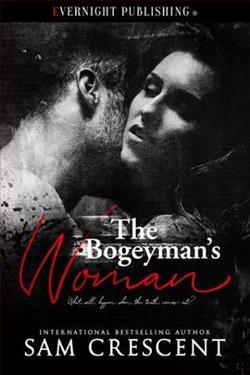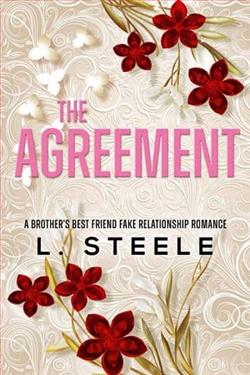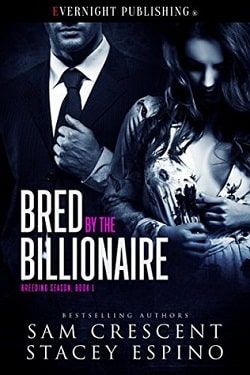Page 48 of Going Home in the Dark
Thorny laughed and let go of Spencer and said, “You remember that nickname, how it hung with you a couple of years?”
“No. I just—”
“You were five years old,” Thorny said, “cute as a button. It was July Fourth, and everyone was gathered for a barbecue in my backyard. You wandered on down by the woods, found this baby skunk. You thought it was a kitten, brought it to show everyone. Lord knows why it let you carry it across all that yard ’fore it saturated you.”
A bald man with a lush white beard followed the women. He carried a two-gallon chilled-drink dispenser that would later prove to be full of iced tea. “Welcome home, Skunky! You’re a sight for sore eyes.”
Bobby lost sight of Spencer, who was swallowed into the crowd with great affection. There were forty or fifty people in the house, and they were in high spirits. They wanted to know everything there was to know about Spencer now that he was all grown up. Had he ever married? Was he dating? Who was she? What did he do for a living? Art? What kind of art? Did he ever hear from Constanina?
Because Spencer had sold off most items in the house while he had been in high school, there weren’t many places for the visitors to sit. That was all right, because they were too excited to sit, and someone brought a dozen folding chairs to accommodatethe older people who lacked the stamina for a lot of vertical socializing.
The big kitchen island was covered with enough food to feed a hundred, with an emphasis on baked goods. Stacks of paper plates. Plenty of disposable plastic cups, forks, and spoons. Paper napkins featured bluebirds in opposite corners with a ribbon stretched between their beaks on which the wordfriendshipappeared in flowing script.
Spencer was the star of the show, but though Bobby had lived with the Pinchbecks in another neighborhood, the Nelsoneers—which is what they called themselves if they lived on the last block of Harriet Nelson Lane—were interested in him, too. Some of them knew he was an author, and a smaller number had read some of his books, but their greater interest was in Spencer because he’d once been a Nelsoneer and had come home from crazy, violent Chicago to this little piece of paradise.
People remembered Rebecca from those days when she dressed to appear unattractive. When they recalled the impression she had made on them, her look was described as like “a poor washerwoman out of Dickens, with nothing to wear but rags” and “the kind of nutty old woman who’d live in the woods and do witchcraft” and “a terribly sad, sad urchin.” They wanted to know if she was dating Spencer Truedove. No, they were just friends who remained close. Then was she dating Robert Shamrock? No, they were also just amigos.
Clearly, they knew that she was a famous actress, but none of them spoke of her long-running television show or her hit films.She wondered about their reticence until a woman named Ada Samples—late sixties, sweet-faced, in Ugg boots and a pale-blue Mother Hubbard, hair in a bun—sensed Rebecca’s puzzlement, drew her into a corner, and whispered an explanation.
“They know about your mom and all her Fernandos, how she had no idea who might’ve been your daddy, how you were brought up by your grandfolks, and how they were so nasty two-faced with each other. All that drama, the humiliation and shame, you had to become an actress to express your pain or otherwise kill yourself.”
“Exactly,” Rebecca said. In fact, she had worn those costumes because she’d been unable to cope with the early ripeness of her adolescent body and with the kind of swaggering boys who were drawn to her, boys who were all hands and greedy expectations. She didn’t say as much to Ada Samples, because all she wanted was to get out of this place.
“Just know,” Ada continued, “every Nelsoneer admires how you made something of yourself in spite of the bad hand you were dealt.”
“That’s sweet,” Rebecca said.
“Everyone expected you to be either a skanky disease-riddled junkie living in a gutter or at best a whore.”
“Well,” said Rebecca, “I lucked out when, you know, the acting thing worked for me.”
“Nobody will mention that here now,” Ada explained, “because they know how emotionally unstable actors are. They don’t want to inadvertently say something about your childhood that might trigger a mental collapse.”
“That’s so thoughtful.”
Ada smiled broadly and nodded with evident satisfaction. “Oh, these are very caring people here at the end of Harriet Nelson Lane. I just wanted to be sure you know they aren’t being standoffish. They’re proud you came from Maple Grove. They respect you and pity you and want only the best for you.”
“Am I blushing?”
“No, dear.”
“Good.”
28Scary Discoveries
If his favorite songwriter hadn’t been upstairs, lying in the wall behind the foldaway bed, Bobby the Sham would seriously have considered setting the living room draperies on fire to clear the visiting neighbors from the house. However, he didn’t know how long it would take to get the crowd out of the place or how fast flames might spread from the draperies to the structure itself. When you started a fire to break up a party, you couldn’t be certain you would then be able to extinguish it quickly in the wake of the last departing guest. If this had been a novel he was writing, he could have done a lot of research on the subject, but this was not one of his novels; this was real life, a true story currently unfolding, involving real people in extraordinary circumstances. He couldn’t simply stop the action, save the document, copy it onto his Seagate Backup Plus hard drive, and go off to educate himself about arson.
By several sly maneuvers, he extricated himself from the crowd and retreated to the laundry room, where he could be alone behind a closed door. He needed to engage in some deep-breathing exercises that were said to lower blood pressure and improve brain function.
The space might have inspired mild claustrophobia if Spencer hadn’t sold the washer and dryer in his junior year of high school.
Bobby breathed so deeply that his nasal septum and various cartilages attached to his nasal bones vibrated with a sound like thrumming insect wings, as if he had inhaled a bee. However, he had not inhaled a bee, because if hehadinhaled a bee, he would have been sneezing violently.
Bobby was alone such a short time that he neither lowered his blood pressure nor improved brain function before the door opened. A man entered. He nervously glanced back into the short hallway off the kitchen, closed the door, and stood with his back against it. He was in his forties, muscular, with bangs that suggested his barber must be operating under a forged license.
“I’m Warren Weber. You’re Robert Shamrock.”
“I might be.”















